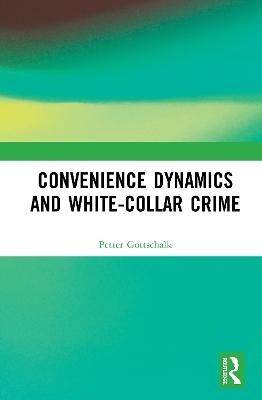
Convenience Dynamics and White-Collar Crime
Seiten
2020
Routledge (Verlag)
978-0-367-54404-1 (ISBN)
Routledge (Verlag)
978-0-367-54404-1 (ISBN)
This book introduces a dynamic perspective to study white-collar crime. It argues that as personal motives change, so too do organizational opportunities and willingness for deviant behaviour. It will be of interest to those working in areas of Criminal Justice, Criminology, Criminal Law and Business Studies.
This book introduces a dynamic perspective to study white-collar crime. It argues that as personal motives change over time, so too do organizational opportunities, and willingness for deviant behavior.
The work contends that the extent of white-collar crime is dependent on the extent of crime convenience perceived and preferred by potential offenders. It discusses how potential white-collar offenders expand organizational opportunities for financial crime over time. The dynamics are illustrated here by system dynamics models to capture cause and effect relationships. The book also presents a new structural model illustrating the elements of convenience theory along with a new dynamic model illustrating the evolution of white-collar crime. The practical aspects are illustrated with a number of case studies.
The book will be of interest to researchers, academics and professionals working in the areas of Criminal Justice, Criminology, Criminal Law and Business Studies.
This book introduces a dynamic perspective to study white-collar crime. It argues that as personal motives change over time, so too do organizational opportunities, and willingness for deviant behavior.
The work contends that the extent of white-collar crime is dependent on the extent of crime convenience perceived and preferred by potential offenders. It discusses how potential white-collar offenders expand organizational opportunities for financial crime over time. The dynamics are illustrated here by system dynamics models to capture cause and effect relationships. The book also presents a new structural model illustrating the elements of convenience theory along with a new dynamic model illustrating the evolution of white-collar crime. The practical aspects are illustrated with a number of case studies.
The book will be of interest to researchers, academics and professionals working in the areas of Criminal Justice, Criminology, Criminal Law and Business Studies.
Petter Gottschalk is a professor in the Department of Leadership and Organizational Behavior at BI Norwegian Business School in Oslo, Norway. Dr. Gottschalk has published extensively on knowledge management, intelligence strategy, police investigations, white-collar crime, and fraud examinations.
1 Deviant Convenience Structure
2 Deviant Convenience Dynamics
3 Negative Organizational Dynamics
4 White-Collar Convenience Evolution
5 Operationalization of Convenience
6 White-Collar Convenience Themes
7 Social Security Fraud
8 Case Study: FIFA Bidding Process
9 Filling the Governance Gap
10 Case Study: Movie Piracy
11 Stage Model for Offenders
12 Crisis-Response Dynamics
| Erscheinungsdatum | 15.09.2020 |
|---|---|
| Zusatzinfo | 20 Tables, black and white; 19 Line drawings, black and white; 19 Illustrations, black and white |
| Verlagsort | London |
| Sprache | englisch |
| Maße | 156 x 234 mm |
| Gewicht | 453 g |
| Themenwelt | Recht / Steuern ► Strafrecht ► Kriminologie |
| Wirtschaft ► Betriebswirtschaft / Management ► Marketing / Vertrieb | |
| ISBN-10 | 0-367-54404-0 / 0367544040 |
| ISBN-13 | 978-0-367-54404-1 / 9780367544041 |
| Zustand | Neuware |
| Haben Sie eine Frage zum Produkt? |
Mehr entdecken
aus dem Bereich
aus dem Bereich
klare Antworten aus erster Hand
Buch | Softcover (2023)
UTB (Verlag)
CHF 27,85


